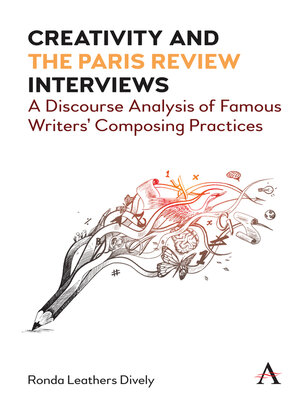Creativity and "the Paris Review" Interviews
ebook ∣ A Discourse Analysis of Famous Writers' Composing Practices
By Ronda Leathers Dively

Sign up to save your library
With an OverDrive account, you can save your favorite libraries for at-a-glance information about availability. Find out more about OverDrive accounts.
Find this title in Libby, the library reading app by OverDrive.



Search for a digital library with this title
Title found at these libraries:
| Library Name | Distance |
|---|---|
| Loading... |
Creativity and The Paris Review Interviews: A Discourse Analysis of Famous Writers' Composing Practices centers around a thematic discourse analysis of a 2000-page corpus of Paris Review interviews, focusing on the creative processes of some of the world's most famous fiction-writers and poets. The discourse analysis traces elements of the paradigmatic creative-process model—first insight, preparation, incubation, insight, verification—through the focal artists' descriptions of their composing practices as embedded in the interview transcripts. That analysis also reveals multiple and significantemergent themes germane to fiction and poetry writing. The ultimate goal of this analysis is to identify patterns relevant to the aforementioned creative-process elements and themes that are suggestive of specific strategies writers can employ to facilitate their own composing acts—whether fictional, poetic, or expository. Such findings will also benefit teachers seeking to facilitate student success in the composition classroom. Such applications to expository writing are bolstered by a thorough treatment of scholarship on intersections between creativity theory and composition theory.
|Creativity and The Paris Review Interviews: A Discourse Analysis of Famous Writers' Composing Practices centers around a thematic discourse analysis of a 2000-page corpus of Paris Review interviews, focusing on the creative processes of some of the world's most famous fiction-writers and poets. The discourse analysis traces elements of the paradigmatic creative-process model—first insight, preparation, incubation, insight, verification—through the focal artists' descriptions of their composing practices as embedded in the interview transcripts. That analysis also reveals multiple and significantemergent themes germane to fiction and poetry writing. The ultimate goal of this analysis is to identify patterns relevant to the aforementioned creative-process elements and themes that are suggestive of specific strategies writers can employ to facilitate their own composing acts—whether fictional, poetic, or expository. Such findings will also benefit teachers seeking to facilitate student success in the composition classroom. Applications to expository writing are bolstered by a thorough treatment of scholarship on intersections between creativity theory and composition theory.
This book is informed by four critical premises, each of which is explicitly addressed:
In examining and supporting these premises, author Ronda Leathers Dively employs various scholarly lenses from a number of disciplines—most significantly rhetoric and composition, psychology, and education. The findings of the analysis are supported by raw quantitative data (in the form of total "hits" establishing the strength of given themes) and illustrative qualitative data (in the form of direct quotes and paraphrases exemplifying these...







